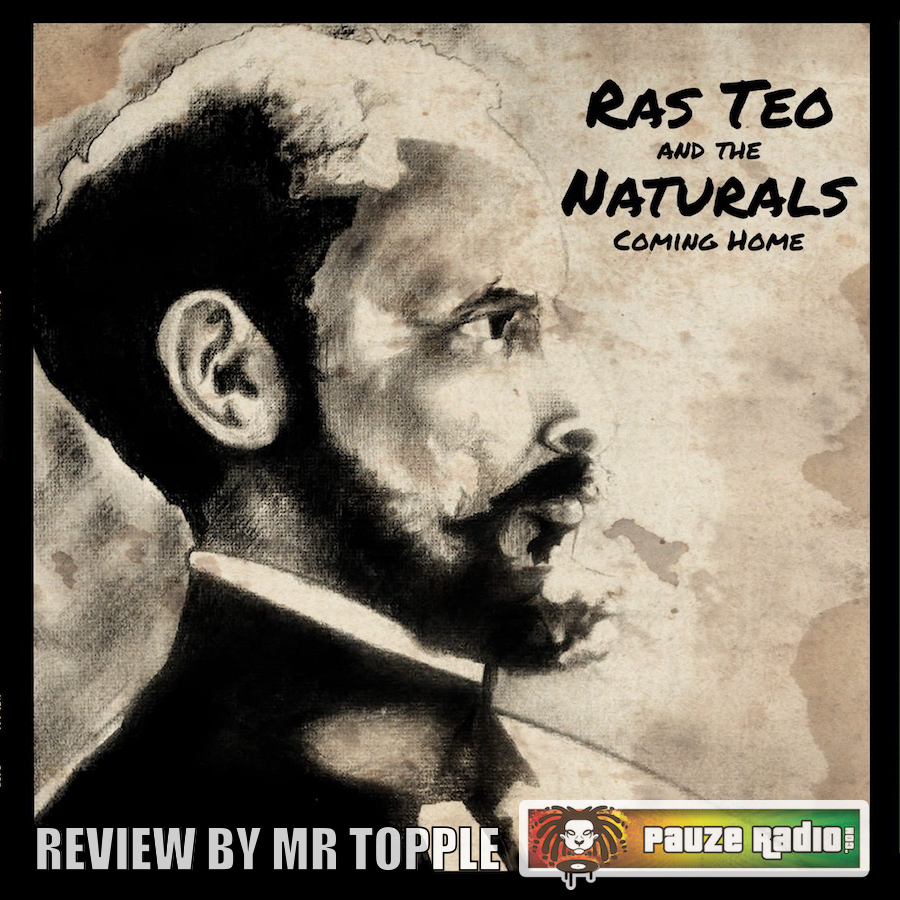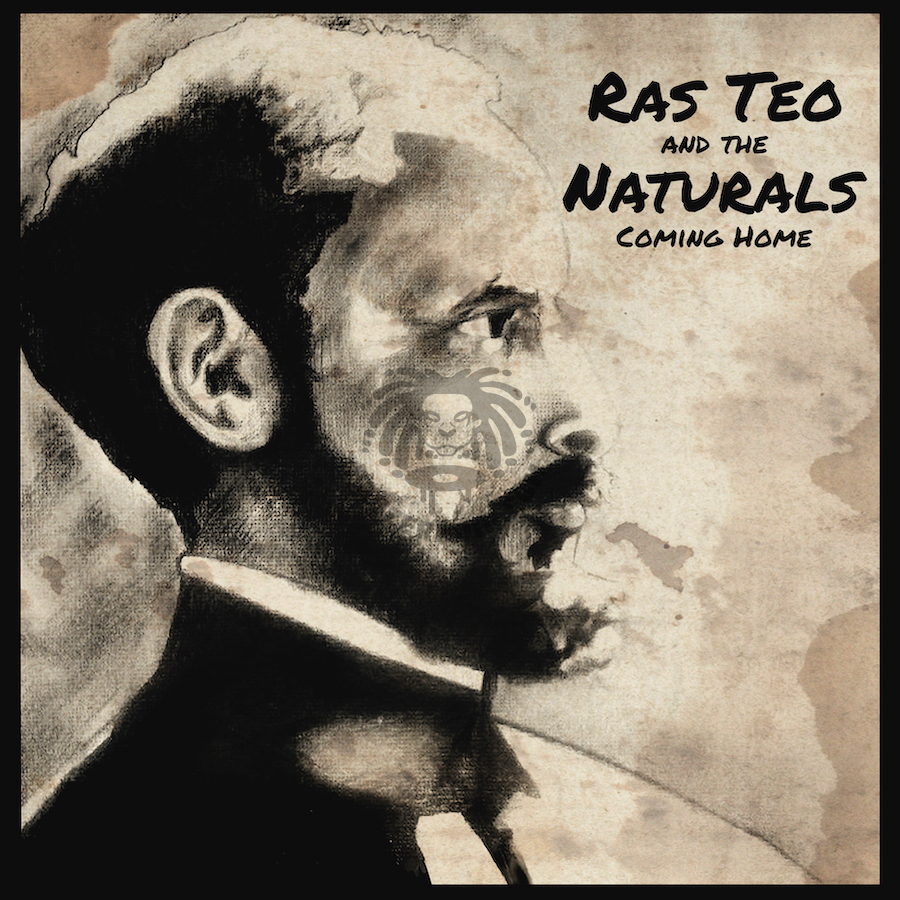
Ras Teo And The Naturals – Coming Home – Review
Ras Teo and The Naturals: Coming Home Album Review by Mr Topple for Pauzeradio.com.
Ras Teo is back with yet another release – this time, going home to his roots via an eclectic and visionary project.
Coming Home, released via King Solomon Productions and distributed by Lone Ark, sees Teo team up with musicians from Sweden in a highly interesting move.
King Solomon Productions told Pauzeradio:
“Roughly five years ago Teo reached out to Magnus (Daddy Natural) with the question, why don’t we work together? The reason for that is that Teo would like to come home and do an album with Swedish musicians from his hometown Uppsala. So, the choice was easy.
“The longtime bass player from Natural Way who brought in his son Junior Natural who left the mic for the drums on this project. So, the core of the Naturals is Uppsala-based musicians. On backing vocals, we have Swedish Reggae acts Papa Dee, Peter, and Oscar to sweeten it up with international help from Ashanti Selah and Roberto Sanchez. Same goes for the horn section: Bosse, Lasse, and Tage from Uppsala with beautiful international help from Zoe Brown, Patrick Aba Ariginal, and Trevor Edwards.
“This is the first of a series of Ras Teo in collaboration with Magnus Daddy Natural. The future looks bright”.
However, does Coming Home sound bright? Undoubtedly yes. First, and there’s some slick mastering from Tomas Bodén across the record – creating a sound that rich and well-balanced.
Overall, the production from Daddy Natural (sometimes in collaboration with Teo) is exquisite – filling the album with varying compositions and an extremely high level of attention to detail.
Side A of the vinyl opens with Mankind – which sets the tone for the entire record perfectly. An opening sequence is filled with sounds of the Motherland – from pattering djembe (or similar), shakers, and a washboard via the flute which weaves around the track. This style is maintained throughout – offering an enhanced Nyabinghi-style experience for the listener. Reggae elements are all but absent, aside from the winding bass line. Teo’s vocal is chant-like, fitting the overall thrust of the composition perfectly – and lyrically, he’s created a solemn warning to all of us: that humans have lost their way, despite Rastafari’s desperate pleas for us to follow Jah. The “signs of time” are all there, and we must wake up. Perfect, Nyabinghi-influenced fayre.
Part Timer moves Coming Home to Roots – albeit with some heavy smatterings of Dub and Jazz along the way. Basic Roots musical devices are present – from the winding bubble rhythm keys to the equally winding bassline, via drums on a persistent one drop and a delicious, rocky guitar line, full of bending. However, the real magic comes from the inflections of the other genres. Dub breaks are well-positioned, as is the use of rhythmic reverb. Then, the horns take in some Jazz via exceptionally well-improvised sections, filled with blue notes and complex rhythms as well as some strong call and response duties. Teo’s vocal has taken some inspiration from here at points as well, as he winds around the track using glissandos, some sharp enunciation versus strung-out sounds, and heavy vibrato. Lyrically, Part Timer is quite brilliant, too – calling out the cultural appropriation of Rastafari by people of little or no faith at all. Smooth yet forceful.
My African King combines Roots sensibilities with overt influences of the Motherland. The track is fluid and forward moving thanks to a swaying bass line, some increased activity across the main drum line, and Teo’s winding vocal. Bubble rhythm keys maintain focus in the background, while one guitar does an embellished skank, and another runs some interesting riffs. The horn section is once again attractive – adding to the momentum of My African King with some rapid-fire response sequences. The inclusion of those pattering African djembe and some tin drums brings even more forward movement as well as nods to the subject matter, as Teo delivers a near-Song of Praise to Selassie which is warm yet potent in its description of the feeling of faith.
Jail House then smashes everything that came before it – taking Coming Home to the feeling of Reggae from the 1990s, where emotive chord progressions meet RnB/Gospel-style backing vocals and some stripped back instrumentation delivers some lovely moments. Those major-to-minor key switches are beautiful and compounded by the work across an electric organ and the flute. This is then built upon with the Dub-style breaking, then rebuilding, of the instrumentation two-thirds of the way through. The inclusion of some military rolls on the snare hint at the difference between the musical backdrop and the lyrical content – as Jail House’s whimsical composition contrasts with Teo’s near-desperate vocal performance (filled with inflections of Soul via use of varying dynamics), and the narrative. He uses Jail House as a metaphor for being subjugated under Babylon’s toxic system, and the ensuing word play sums up the situation brilliantly. Genius.
Side A concludes with Captain Cudjoe. Here, Natural and Teo wind things back again – this time to something of the 1980s Dancehall, where the sound was predominantly Reggae but with that signature root to seventh chord progression (present here). However, the track isn’t as straightforward as that, as we have a veritable smorgasbord of instruments going off at varying tangents. From the responsive horns to the lilting Rock guitars, via Gospel backing vocals, a soulful electric organ, and keys which border on the Jazz – Captain Cudjoe is an immersive musical experience which demands multiple listens. Teo’s vocal is engaging and compelling – going from straight vocal to spoken word and back again – filled with enthusiasm and passion for the subject matter. Of course, the song is a biographical praising of Cudjoe, one of the most prominent leaders of self-emancipated slaves during Britain’s colonial occupation of Jamaica. It’s a fitting and engaging tribute – and one which is always pertinent, but particularly now.
Side B of the vinyl opens with Blaming Me Blaming You. It’s a brooding and unsettling Roots track. Predominantly in a minor key, the rhythm section keeps things progressing forward via a busy drum and percussion line, and some nice touches that expand upon a bubble rhythm on the keys. The inclusion of a funky electric organ here is evocative, as is the flute line and some stark horn arrangements. Teo and the backing vocals are really strong on Blaming Me.. with him moving around his entire range, switching dynamics to match the lyrics, and making excellent use of fluttering vibrato. His performance, and the backing vocals, are perfectly pitched to the composition – as is the lyrical narrative, discussing how Babylon’s toxic influences turn us against each other without us often realising what’s happening. Stirring and thought-provoking work.
Jonah then moves the Roots sound slightly further forward – oddly, though, in the same key as Blaming Me… There are musical similarities to be had as well, as the track is forward moving, with those sumptuous backing vocals present once more. However, here the influence of Africa is back via pattering djembe. Also, the Dub vibes are strong – particularly a stark break just before the halfway point. Horns are also forthright – evoking the feeling of a storm as per the namesake’s experience. Teo is a masterful storyteller, delivering a performance as if it was in front of a group of school children, i.e. thoroughly expressive and engaging. There’s something of a metaphor to be found in his use of the Jonah and the Whale narrative – clearly referring to Rastafari as being in the ‘belly of Babylon’, but without saying it out loud.
Bil Back winds the pace down somewhat, as well as the arrangement, with a smooth yet unsettling Roots feeling across the track. The meandering drum line – here with a fairly dominant kick – coupled with a stuttering bass and persistent bubble rhythm keys are well-utilised to give Bil Back a pointed and purposeful vibe. Then, the flute once more accentuates the main instrumentation, fluttering in and out – while a guitar does similar albeit with some decent reverb added. Teo’s vocal is perhaps more laid back in terms of interpretation than previously seen – as he draws out more notes than he delivers staccato ones. However, he is urgent in terms of melodic and dynamic arrangement – which juxtaposes well against the lyrical narrative.
Then, Rock Of Gibraltar marks an interesting turn of events on Coming Home. The sound is suddenly more involved again – with some ramping up of the drum arrangement, and keys heavily deviating from a bubble rhythm, doing some rapid-fire improv sections at times. The horns are equally frantic, running complex melodies and rhythms before engaging in pointed staccato phrases. The electric organ mimics the keys, guitars whine, and the bass tops this all with a drop-beat, winding rhythm. Teo mimics all this well, with an edgy and at times stuttering performance, focusing heavily on shorter notes – but when delivering longer ones, stringing them out intentionally. Lyrically, it’s another sombre warning about how Revelation times are upon us, and that Rastafari are the metaphorical ‘Rock of Gibraltar’ in the unfolding madness. It’s stark at times, rich at others – and works very well.
Coming Home closes with Demon Is A Liar. It’s a departure from most of what came before it – seeing the album move into smoother, richer, and more Soulful Roots territory. The rhythm section is still pointed – treading a distinctly Roots path with the usual devices in play, but with a heavy focus on beats two and four across it. However, the interest here is in the other instrumentation. The guitar line is fantastic – utilising blue notes, bending, and reverb a-plenty to give the feeling of Rock-Soul. Horns strut across the track, coming in and out at points to respond to Teo’s main call. The inclusion of an 80s-style synth drum pad is inspired, and the electric organ finishes off this gorgeous sound perfectly. Teo is smooth and filled with attitude, here – almost passive-aggressive at points, as he veers between the gentle and forceful. Lyrically, he’s also created a brilliant discourse around Babylon and how it seeks to keep us subjugated through lies, manipulation, and badmind. It’s a brilliant conclusion to the project – and perhaps one of the stronger tracks.
Overall, Coming Home is a superb effort from all involved. It’s a musically sweeping project that swerves from Roots to Dub via Jazz, Soul, and Nyabinghi and back again; no mean feat but here it’s pulled off brilliantly. Teo shows his abilities throughout, and lyrically it’s also a compelling project. Another stunning record.
Do you need a review, biography or press release? Book our services for your latest release here.
Ras Teo and The Naturals Coming Home Review by Mr Topple / Pauzeradio PR Services (29 March 2024).














